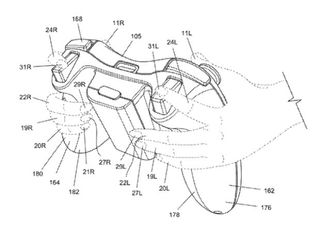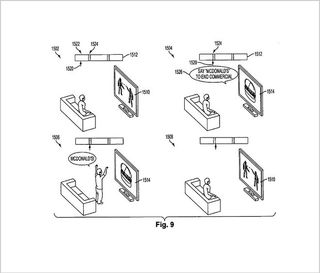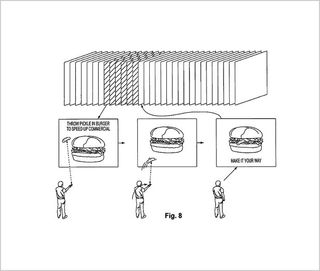The wonderful(?), terrible(?) future of video game advertising
Your privacy will never, ever be the same
Biometrics
Next-gen games may take an even more direct path to sensing your emotions. Another Microsoft patent discovered last year builds biometric capabilities into an Xbox controller; just by touching the controller, the connected system would be able to identify you based on a pressure profile. That pressure sensitivity could also translate into detecting mood. A tight grip, for example, might indicate anger or focus.

Every extra bit of data advertisers have to work with will affect how they target their audience. We wouldn't bet on that pressure sensitivity making it into the next Xbox controller, but biometrics definitely have the potential to change how we interact with games. Valve experimented with biometric reading in Left 4 Dead 2, and found that sharing information about players' emotions within the game affected how they played. Players would be more protective of the teammates who reacted strongest to the game, and would likewise target enemy players who seemed the most rattled.
Imagine how useful that kind of data could be for targeted advertising. Combined with dynamic in-game advertising, biometrics could give advertisers the ability to push a comforting product during a scary sequence or a more expensive product at a celebratory moment. That kind of selective, hyper-specific advertising really is getting into sci-fi territory--maybe it'll be practical by 2020, but probably not in the immediate future, especially since the biometric reading Valve did required special equipment.
Even without biometrics, the next generation of video game advertising will be more specific and individually targeted than ever.
Ads get personal, ads get interactive
Imagine a future where the longer you spend on the internet, the more advertisers know about you. Wait, did we say "future?" We meant "has been happening for like eight years." Think about how much Google knew about you when you first signed up for a Gmail account half a decade ago. Not much! Now they use your age, location, search history, and other identifying factors to tailor advertisements and information directly to you. Now think about Facebook, and how much of your personal information is saved on the site.
With Sony planning to push real names and established social networks like Facebook on the PlayStation 4, there will be a convergence of data advertisers find extremely useful. They won't just target you based on age, sex, and gaming history--they can potentially target you based on the movies you posted about on Facebook and the brands you prefer. Some of that advertising may show up in games, but most of it will be right on the dashboard of the next Xbox and, most likely, the PlayStation 4.

From what Sony has shown of the PlayStation 4's interface, it bears a noticeable resemblance to Microsoft's tile-based Modern UI. We expect ads to show up in a similar way, too. Sony missed out on a lot of money this generation by offering access to the PlayStation Network for free. In many ways, it was a smart and even necessary move--in 2006, Microsoft had a big lead in the online world. Even if Sony doesn't charge gamers to play games online, maintain friends lists, and so on, they'll use ads to more effectively monetize PSN. A Penny-Arcade Report article from 2012 deduced that Microsoft makes somewhere in the vicinity of $200,000 for a single ad that lasts a single day on Xbox Live. And that's just a normal weekday--a holiday ad may cost closer to $350,000. Again, for a single day.
Sign up to the 12DOVE Newsletter
Weekly digests, tales from the communities you love, and more
Sony will want some of that money, which means more user interface advertisements in the future. And advertisers paying out big bucks for those campaigns will want to make sure their ads are going to the right customers. They're also going to be more interactive. In January, Microsoft announced that its natural user interface "NUads" were a huge success. The first wave of NUads, which were simple polls, pulled in 37 percent of the audience, an absolutely huge engagement number for an ad. People who clicked on ads could vote with Kinect by hovering their hand over a word or saying it out loud. More and more advertisements will try to engage viewers this way in the future.

Last year, a Sony patent filed in 2009, called "System for converting television commercials into interactive networked video games," surfaced and created quite a stir in the gaming community. The patent seemed to represent the absolute worst in forceful advertising, and images in the patent, like one that says "Throw pickle in burger to speed up commercial," are so ridiculous that some people thought they were fake. Another depicts a poor soul standing, fists in the air, yelling "McDonalds!" to end a commercial.
The patent's real, but the interactive ads on next-gen consoles probably won't be that horrible. Most of them, anyway. We hope.
To the future?
Ads in the world of gaming are here to stay, and they're going to keep pushing harder for audience participation. Devices like the Kinect could potentially lead to some really weird, privacy-invading ads, but corporations as big as Microsoft take a lot of flack for collecting personal information without alerting their customers. Odds are, a whole lot of next-gen ads are going to look like the ads on your Xbox Live dashboard right now, but we'll still be reading our privacy policies carefully this fall.
And looking on the bright side: If sponsored in-game content really takes off, at least we'll get some free stuff for staring at ads. Maybe.

Final Fantasy 7 Remake and Rebirth battle director says combining everything he learned on Monster Hunter: World with Square Enix's technology and unique skills created a "chemical reaction"

"Minutes after Palworld released," Pocketpair was already getting game pitches from "some really big names" before it even set up its own publisher: "No one has money at the moment"











